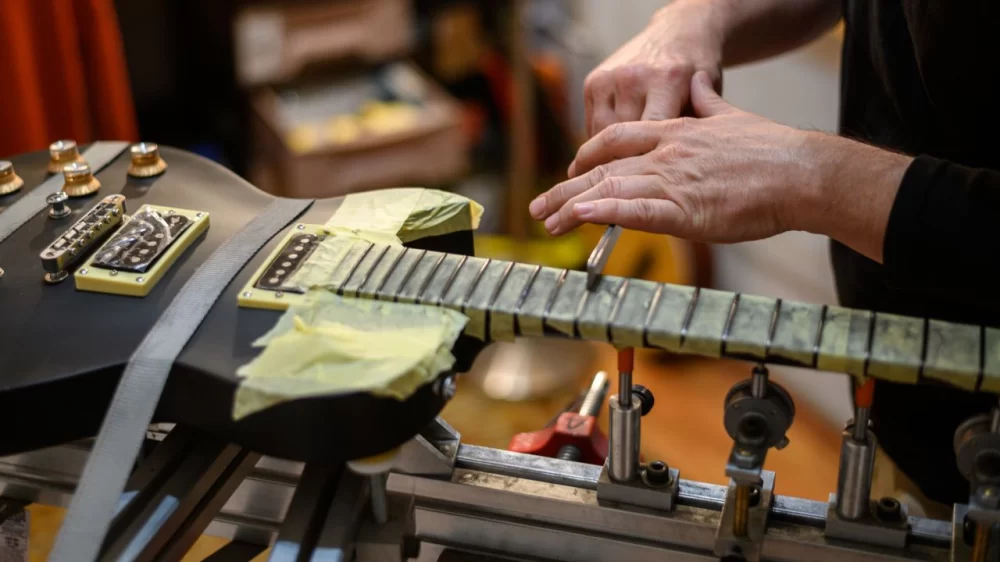
The Importance of Caring for Your Electric Guitar
As a guitar player, my electric guitar has always been one of my most prized possessions. I remember the first time I bought my electric guitar—its sleek design, smooth finish, and the sound it made when I plugged it into my amp were just perfect. But over time, I learned that owning an electric guitar isn't just about playing it—it’s about taking care of it. Proper care is essential for keeping your guitar in top shape, ensuring that it performs well for years to come. Whether you're a beginner or a seasoned guitarist, knowing how to care for your instrument will help you avoid costly repairs and maintain its sound quality.
vbnetThe Role of Regular Maintenance
When I first started playing, I didn't think much about maintenance. I just picked up my guitar, played for hours, and hoped it would always sound perfect. However, I quickly realized that without proper maintenance, even the best electric guitars can degrade in both tone and appearance. Regular care can prevent issues like dead strings, dirty fretboards, and even electrical malfunctions. Let me share with you the key aspects of maintaining your electric guitar.
1. Cleaning Your Electric Guitar
Cleaning your electric guitar is one of the easiest yet most important steps in caring for it. I remember when I first started, my guitar was covered with fingerprints and dust after each session, which started to affect its appearance and performance. Over time, I learned that cleaning the body, strings, and hardware can make a huge difference in both the aesthetics and sound quality of your instrument.
Cleaning the Body
The body of your electric guitar is exposed to all kinds of environmental factors, like dust, dirt, and sweat. I’ve used a microfiber cloth for years to wipe down the body after every practice session, which helps prevent the buildup of grime and keeps the finish intact. For deeper cleans, I recommend using a guitar polish specifically designed for electric guitars. Be sure to apply it sparingly, as too much polish can damage the finish. I personally love using a mild guitar cleaner, as it leaves a protective layer that helps preserve the paintwork and gloss of the body.
Cleaning the Fretboard
One part of my guitar I often neglected was the fretboard. Over time, it accumulated oils from my fingers, which can make it feel sticky and dirty. To clean the fretboard, I recommend using a fretboard cleaner or lemon oil. I’ve found that applying a small amount of lemon oil not only cleans the fretboard but also helps to hydrate the wood, preventing it from drying out. If your fretboard has become particularly grimy, you might want to consider using a soft-bristle brush to remove stubborn dirt from the frets.
Cleaning the Strings
Electric guitar strings can accumulate dirt and oils from your fingers, which can affect their tone and longevity. I’ve always found that wiping the strings down with a cloth after every session helps prolong their life. If you notice that your strings are losing their brightness or tone, it might be time to replace them. Generally, strings need to be changed every 3-4 weeks, depending on how often you play. Some guitarists even use string cleaners to maintain their strings between changes, but I find a simple wipe-down does the trick for me.
2. Storing Your Electric Guitar Properly
One of the most critical aspects of caring for your electric guitar is proper storage. When I first started playing, I used to leave my guitar lying around, thinking it would be fine. However, I quickly realized that improper storage can lead to issues like warped necks, out-of-tune instruments, and even damage to the body. Now, I make sure my guitar is stored properly in a safe environment, away from extreme temperatures, humidity, and direct sunlight.
Using a Guitar Case
If you're not playing your guitar, it's best to store it in a hard-shell case or a padded gig bag. A case provides excellent protection from accidental bumps, knocks, and exposure to the elements. I always store my guitar in its case when I’m not using it, and it’s helped keep the instrument in excellent condition. A case also protects the guitar’s electronics and hardware, which can become damaged if left exposed to the elements.
Avoiding Extreme Temperatures
Electric guitars are sensitive to temperature changes, and extreme heat or cold can cause the wood and glue to expand or contract, which may affect the guitar’s structure. I always try to avoid leaving my guitar in places like the car, especially on hot or cold days. A stable temperature environment is key to maintaining the guitar’s integrity over time.
3. Maintaining the Electronics
One aspect of my electric guitar that requires regular attention is the electronics. Guitars with active pickups and electronic components are prone to wear and tear, especially if they’re not properly maintained. I’ve had to deal with issues like crackling or buzzing sounds from the output jack and knobs, which can be quite frustrating during a performance or practice session.
Checking the Output Jack
The output jack is one of the most common sources of electrical issues. If you notice that your guitar is producing a weak or intermittent signal, the first thing I check is the output jack. Over time, the connections in the jack can loosen, and dirt or corrosion can build up. To prevent this, I make sure to clean the output jack regularly using compressed air or contact cleaner. If you’re unsure how to do this, it’s a good idea to take your guitar to a professional technician for a quick check-up.
Potentiometers and Switches
The potentiometers (volume and tone knobs) and the pickup selector switch are other critical components that can wear out over time. I’ve experienced scratchy or unresponsive knobs in the past, and I’ve learned that a small amount of contact cleaner can often fix this issue. Simply spray a small amount into the pots and turn the knobs back and forth to help clean the internal components. If the issue persists, it may be time to replace the parts or have a professional do it for you.
4. String Care and Tuning
One of the first things I learned as a guitarist is that maintaining your guitar strings is key to ensuring a smooth, consistent playing experience. Keeping your strings clean and properly tuned ensures that your guitar stays in top shape and sounds great. I’ve spent many hours learning the best methods for keeping my strings in tune and maintaining their tone.
Changing Strings Regularly
As a guitarist, one of the most frequent tasks I perform is changing my guitar strings. I’ve found that replacing the strings every 3 to 4 weeks helps maintain the tone of the instrument and prevents string breakage during performances. When changing strings, I make sure to clean the fretboard and check the guitar’s overall condition. I also like to experiment with different string gauges to find the best fit for my playing style.
Tuning Your Guitar
Keeping your guitar in tune is one of the most basic yet vital aspects of maintenance. Over the years, I’ve found that tuning my guitar every time I play helps prevent the strings from becoming overstretched. I use a clip-on tuner for quick and accurate tuning, but there are plenty of tuning apps available that work just as well. Whether you're using a tuner or tuning by ear, always check the tuning before you start playing to ensure your guitar sounds its best.
Final Thoughts on Guitar Care
Caring for your electric guitar is an essential part of being a guitarist. By following the simple steps I've outlined—cleaning, storing, maintaining electronics, and keeping your strings in good condition—you’ll ensure that your guitar stays in top shape for years to come. Regular maintenance not only keeps your instrument playing its best, but it also adds to the enjoyment of playing. Trust me, taking the time to care for your guitar will pay off in the long run, and your instrument will thank you for it!








